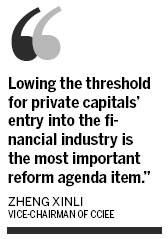Private capital inflows should be liberalized, adviser says
Updated: 2013-07-28 08:25
By Zheng Yangpeng(China Daily)
|
|||||||

Easing private capital's entry into the financial industry should be the sector's foremost reform concern, a prominent policy adviser said at a Saturday conference.
Zheng Xinli, vice-chairman of the China Center for International Economic Exchanges and former deputy director of the CPC Central Committee's Policy Research Office, said allowing private capital to set up joint-equity banks is critical in transforming the nation's banking industry from a seller's to a buyer's market. It would reduce financing costs for small and medium-sized enterprises.
He made the remarks at the China Financial Innovation and Development Summit.
"The market's pivotal role in the resource-allocation process will be undermined if a double-track price system remains in China's financial market," Zheng said.
"Lowing the threshold for private capitals' entry into the financial industry is the most important reform agenda item."
Zheng has participated in the drafting of several of the country's five-year plans over the past 20 years.
He believed private banks and other small, local financial institutions should flourish before the establishment of local financial regulation, deposit insurance and loan guarantee systems. These should be followed by interest-rate liberalization.
He attributed the past year's ballooning of China's non-banking loans to the inappropriate sequence of the reform steps. Since the middle of last year, the cap on the bank deposit rate was raised to 110 percent of the benchmark rate. Facing narrower interest-rate spreads and fiercer competition, most Chinese banks chose to expand off-the-balance-sheet lending, resulting the dramatic rise of the "shadow banking system".
"Driven by higher profits, banks changed the balance-sheet businesses to off-the-balance-sheet financing, which in effect is arbitrage and rent-seeking," he said.
The surge of non-banking lending has led to the shrinking of new yuan loan shares in the total lending structure. According to the People's Bank of China, the share of new yuan loans for social financing has fallen to 50 percent in the first half of this year, from 62.4 percent a year ago.
"The essential reason behind last month's inter-bank liquidity squeeze is the reform sequence is not right. When competition has not fully developed, market liberalization leads to rent-seeking and monopolies," he said.
China's "big five" State-owned banks accounted for 54 percent of the industry's assets. These banks prefer to lend huge amounts to State-owned enterprises and local governments, People's Bank of China counselor Li De said.
Zheng said that, since China has embarked on interest rate liberalization and removed the lending-rate floor in July, the next step is to scrap the deposit-rate ceiling - the reform's final step. But the deposit insurance system should first be established to protect depositors.
Economist Paul Zane Pilzer, who was an economic adviser for two US presidents, also mentioned the deposit insurance system's importance in his speech.
"The deposit insurance served the US' national interest. The higher the risk is, the higher banks pay for the premium."
zhengyangpeng@chinadaily.com.cn
(China Daily 07/28/2013 page2)